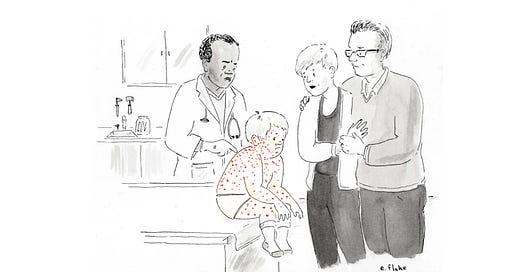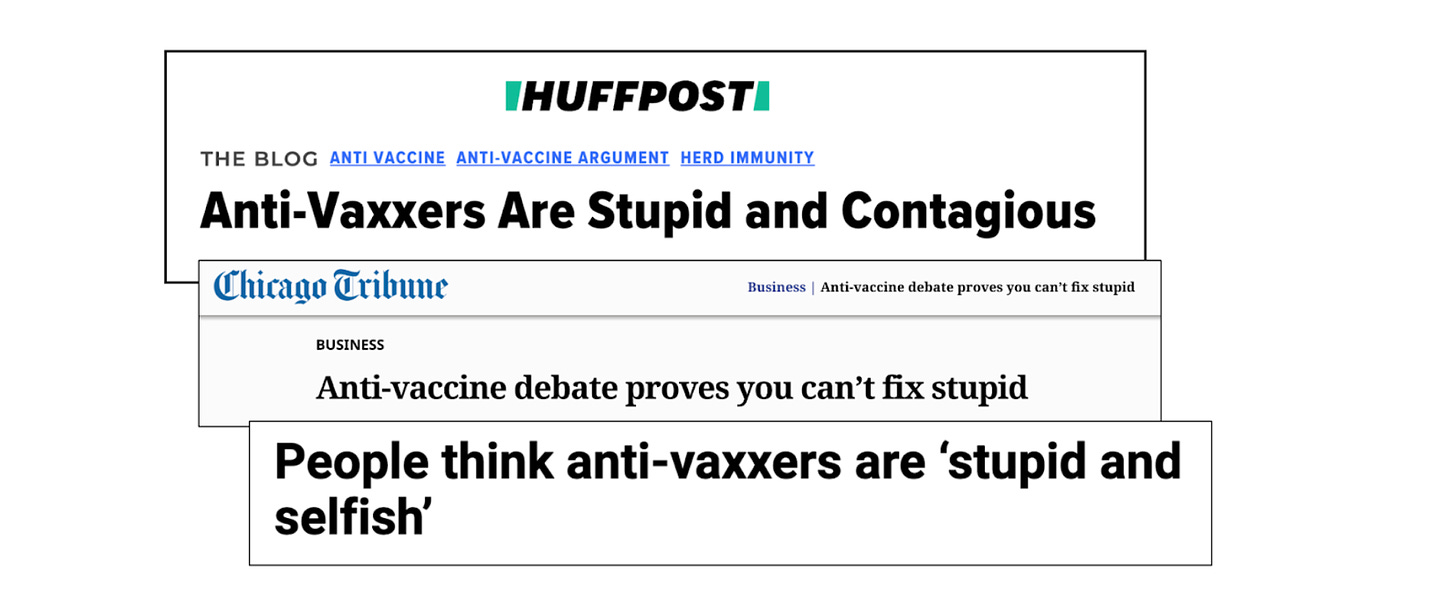They're idiots. Why don't they trust us?
Shame doesn't work, but we keep using it.
This is post 3 of 4 in this mini-series looking back at the public health communication around the COVID vaccines, why trust was lost, and where communication broke down. The goal is not to point fingers or assign blame, but to get a view from outside our bubble and understand how messages were perceived. Catch up on the first two posts: misinformation versus miscommunication and expectation management.
Shame doesn’t work, but has become widely adopted as a response to vaccine misinformation.
“Denormalizing”—the process of reinforcing a negative behavior as socially unacceptable, can be beneficial, and has proven successful in public health efforts such as campaigns to reduce smoking. However, it’s a double-edged sword—efforts to denormalize a behavior can lead to shame and stigma, which don’t help. We know from the literature around smoking and alcohol use that shame and stigma not only don’t work, but often backfire. One study found exposure to negative stereotypes about smoking actually increased the drive to smoke.
Denormalization can help, but shame can cause harm. Where is the line?
Renowned shame researcher Brené Brown draws a distinction between shame and guilt that helps clarify: guilt says I’ve done something bad, shame says I am bad. Guilt is helpful—it reveals when behaviors need to change. Shame, on the other hand, smothers us. It employs the ad hominem fallacy—instead of addressing an argument or behavior, it attacks the person themselves.
Guilt says: this was the wrong decision. Shame says: you are idiots.
Shame has, unfortunately, been widely adopted as a strategy to combat vaccination misinformation. An analysis of TikTok videos about vaccines revealed that videos promoting vaccines overall used more negative language and more judgment, while “anti-vax” videos used more positive language and had higher levels of positive appreciation and emotion. In particular, they found pro-vaccine videos sometimes labeled “anti-vaxxers as weak, stupid, fragile, selfish, or crazy and their behaviour as insane or dumb.”
In my own experience, I’ve found this to be true—while I’ve had my fair share of awful comments from people opposing vaccines, I’ve found some of the pro-vaccine comments can also be extremely vicious. For example, I’ve had to delete comments off my Instagram posts from pro-vaccine advocates telling those who distrust vaccines to go kill themselves.
Of course, these extreme vicious comments are the minority, but the ad hominem sentiment that “anti-vaxxers are stupid” has become mainstream, featured in headlines and late-night talk show segments.
Is this strategy working? No, it’s making things worse
While often a well-intentioned effort to combat misinformation, shame-based or “mean” messaging backfires. This is intuitive: we generally don’t take advice from people who treat us with contempt and disgust, even if they have credentials. This is also backed up by data:
In a study conducted during the COVID vaccine rollout, perceived ‘moral reproach’ (feeling morally judged for not being vaccinated against COVID) did not motivate people to get vaccinated, and instead did the opposite—it strongly predicted vaccine refusal.
A study using natural language processing of Twitter conversations found that corrections to misinformation that used positive and polite language were more likely to be effective, whereas corrections that used negative language (calling someone an idiot) were more likely to backfire, further entrenching the recipient in their belief.
Rants get views, and it’s easy to confuse virality with effectiveness. Social media content bashing antivaxxers is often popular because people who already trust vaccines cheer it on. But is this helping reach the people who actually need to be reached? Probably not, and if they do see it, the data suggests it will make them more hesitant about vaccines, not less.
It’s less about facts and more about values
Shame-based messaging ignores a critical dynamic in vaccine hesitancy: vaccine refusal isn’t just about intelligence or lack of understanding of facts and data. Often it has far more to do with people’s values and identity.
Katherine Hayhoe, internationally recognized climate scientist and science communicator, recommends when talking about climate change, the solution is not just showing people more and more data. Instead, she recommends connecting over values they already hold dear. This allows them to incorporate new information into their worldview instead of trying to change a core piece of who they are.
Shame-based messaging does the opposite: instead of connecting with a person’s identity and values, it attacks them.

Why is it so tempting to shame?
A lot of shame-based messaging is driven out of genuine, valid frustration. Just like those rejecting vaccines are not “bad” humans, those shaming them are not “bad” people either. (That would be shaming people for shaming people! Also not helpful.)
Where is this frustration coming from? There are the obvious answers—rejecting vaccines puts both the person and the community at higher risk of disease, leads to worse health outcomes, etc.
But early on in the pandemic, I realized for me (and probably many of you), it was more than that. It wasn’t just about the individual vaccines. It was fundamentally about believing that evidence-based medicine actually works—that systematically collecting data and analyzing it will give us a clearer picture of reality than anecdotes. That we don’t have to go back to the days of basing medical decisions on hunches, fears, and vibes. We have a better way of figuring out what’s real and true.
The rejection of carefully collected, peer-reviewed data in favor of rumors and memes is understandably infuriating. If universally adopted, this would make our society collapse. For people who have devoted their lives to science, medicine, and public health, it makes sense that this gets under our skin and infuriates us.
But in the irony of ironies, reacting out of anger to defend evidence-based medicine is, itself, very much not evidence-based. Unfortunately, it will only make things worse, furthering the very problem we are trying to fix.
How to do better going forward
Focus criticism on the data, not the person. It’s perfectly valid to criticize false beliefs and misleading data about vaccines. But when doing it, make sure your criticism focuses on the data and argument, not the person themselves.
Rant privately. The need to vent your anger is real, do it. But not online—it might entertain those who already agree, but alienate those who we most need to reach.
Kindness will get you further than anger. In defending the data, remember the data: kindness helps, insults do not.
Connect over shared values. People will be far more open to what you have to say if you connect over values you both hold dear.
Bottom line
We must use science to figure out how to regain trust in science. And the science is clear: shaming isn’t helpful. Kindness, empathy, and connecting over shared values are critical for restoring trust in vaccines and science. This might not make us go viral, but it will build bridges instead of destroying them.
Sincerely, KP
Kristen Panthagani, MD, PhD, is a resident physician and Yale Emergency Scholar, completing a combined Emergency Medicine residency and research fellowship focusing on health literacy and communication. In her free time, she is the creator of the medical blog You Can Know Things and author of YLE’s section on Health (Mis)communication. You can find her on Threads, Instagram, or subscribe to her website here. Views expressed belong to KP, not her employer.
“Your Local Epidemiologist (YLE)” is a newsletter with one purpose: to “translate” the ever-evolving public health science so that people will be well-equipped to make evidence-based decisions. This newsletter is free to everyone, thanks to the generous support of fellow YLE community members. To support this effort, subscribe below:







Kristen,
The lack of trust for many of us was Public Health being wrong in real time and not acknowledging or apologizing for the mistakes. Instead, they acted like Shamans and Astrologists, always defending their failed predictions with after-the-fact explanations and promoting unfalsifiable terror scenarios (YLE for example in fall 2021 made a widely circulated post on Facebook stating that PICUs would be overrun by 30% with kids which never happened, but parents pleaded to have schools canceled based on fear like this).
I’m sure you are a very nice person, mean well, but you too have engaged in this and I am sure you aren’t even aware. (making claims of being close to Herd Immunity, supporting mandates on a non sterilizing vaccines, promoting the vaccine in children while the rest of the world paused vaccinations on people under 55-65, etc).
I brought myself up to speed on your writings over the last 4 years on Covid going through your blog over the weekend (I have a lot of free time 😊). A lot of your early work resonated with me.
For example from your 5/10/20 piece “Lessons from Graduate School for the COVID Pandemic” you note:
“It is easy to only pay attention to the data that supports your hypothesis (and ignore
the data that goes against your hypothesis)” and “It is easy to get fooled by early data.”
On 2/9/201, you have an excellent post on “When you can never be wrong: the unfalsifiable hypothesis” outlining the perils of having a theory where counterfactuals can’t be constructed to test and refute a theory.
Great stuff, and I agree with all of that of course, as you are describing the tenets of scientific pursuit outlined by Merton, Feynman, Sagan, Randi, Shermer, etc.
Yet as I continued to go through your blog, I felt you were inadvertently committing the very mistakes you warn your readers against.
Consider on 10/9/21 your piece “If you’re vaccinated, why does it matter if I am not?” where you make an attempt to justify the vaccine mandates and make what I consider to be an unfalsifiable claim:
“I just spent a month in New England (which has a higher vaccination rate overall), and my risk of getting COVID there was much lower than my risk of getting COVID back home in Texas (which has a lower vaccination rate).”
Consider that on 10/9, the 7 day average for cases in Texas was 7232, against a population of 29 million. That means .025% is positive for Covid. Vermont, which was touted as the state where “no one was left to vaccinate” (and I choose Vermont too because Katelyn Jetelina referenced them in a post around 2021 as well I encouraged her to double check her claim [1]) – on October 9th, Vermont had 197 cases/day against 647K population, rate of .03%. Slightly more than Texas.
Why in that post did you believe that Texas was doing poorly while you were safe in New England? Doesn’t the most vaccinated state in New England having more cases per population than Texas falsify your claim? If it doesn’t, can your hypothesis even be falsified?
Further, consider that Covid would absolutely explode across the country and the world, following the vaccine rollout. You make claim in 16 different parts of your essay how “being vaccinated significantly reduces transmission”, yet Covid cases would increase 10-fold in both Texas AND Vermont within 3 months. The NYT graph for vermont: https://imgur.com/a/tptVuaR
Vermont would hit a peak of 2K cases/day, representing .31% of the population, while Texas would have an almost identical peak of 68K cases/day, at .23% of the population.
To me, that should have been enough to reject your claim that Texas was doing worse than New England and caused you to reconsider your entire hypothesis. Your appeals to base rate fallacy crumble when Covid is now up a magnitude post vaccine.
Especially since any confounder you search for to prop up this now tenuous claim favors Texas.
Population denominator Texas grew due to mass migration into the state. The baseline health of Texans is far worse than Vermont..ians? There was a surging undocumented migrant population pouring into Texas, further increasing the population denominator. Texans had tossed aside the masks and social distancing long before Vermont would… at this point you have to get creative to data dredge/p-hack your way into supporting your claim.
You may say “Fine, Covid is surging equally in Texas and Vermont, despite my claim Texas is worse off than New England, but it still greatly reduces your changes of severe outcomes”
That is also wrong.
Following your 10/9/21 post, Texas would have 22.6% more deaths than expected through the end of 2021, near identical than Vermont’s 23.1% - and again, the confounders you may search for all favor Texas having a better outcome.
I am not trying to get you in a “gotcha”. Brilliant people who know how science works make these mistakes ALL OF THE TIME. It’s easy to get fooled as Feynman notes in his takedown of Social Science as “A science which isn’t a science”.[2]
William Farr, a brilliant man and one of the greatest statisticians of the modern era, had all the data he needed to see that Snow’s hypothesis disproved Miasma theory for Cholera, yet Farr stuck to his favored hypothesis for 9 more years.
I could keep going through your blog, finding examples of you making claims that were easily falsified [3], but then I would succumb to Brandolini’s Law.
On a closing note, as I read your blog I see you inadvertently and repeatedly made the mistake of “one directional skepticism”. That is, the things you think are true get a free pass-regardless of how poor the supporting evidence – while only the ideas you disagree with do you apply skepticism.
Ivermectin and HCQ didn’t work, and you were right to explain why in your posts. Yet as noted in footnote [3], you fail to apply that same level of skepticism to the easily debunked claims in the Financial Times articles you cite that high vaccination rates are suppressing the spread of Covid.
A (to me) damning example of one-directional skepticism is your 7/22/20 post “Masked Science: Fact-checking Mask Studies” where you apply rigorous skepticism to a dozen studies claiming cloth masks don’t work, pointing out all the flaws in methodology, rigor, design, and conclusions.
Of course, the consensus on cloth and surgical masks has pivoted back to what we knew 1920-2019 – they don’t work – but you felt inclined to only debunk all the studies suggesting masks didn’t work. Why didn’t you eventually write a blog post admitting “hey we got cloth masks wrong – here is why”?
I wonder, why didn’t you apply that skepticism equally to the hundreds of nonsense studies claiming cloth masks were incredibly effective? Why not tear apart the 2 Stylists in a Missouri salon paper the CDC promulgated? The ridiculous Kansas Mask Study? Abaluck’s RCT in Bangladesh?
Katelyn has made the same mistake – any terrible study showing the wonders of cloth masks got a pass and added to her “Think masks don’t work? Look at the evidence” social media threads [4], while she suddenly became concerned with study design, confounders and p-values when an RCT suggested what we would find out to be true – they are largely worthless after all [5]
It seems to me, as a dispassionate scientist, that you entered the Social Media Covid Blog World with your mind made up – masks work, Covid vaccines work, lockdowns work, etc, and wound up stuck defending these extraordinary and failing theories for reasons I can only guess (Politics? Sunk Cost Fallacy? Availability bias?) using the very pseudoscientific practices you claim to reject.
I apologize if this comes off harsh, I am not trying to be mean spirited – there are just only so many characters we can put in a comment and I don’t know if any of this will be read anyway 😊
(PS 100% agree with your post “don’t censor threads” even if threads is dead – the message is spot on)
_______________________
[1] https://yourlocalepidemiologist.substack.com/p/state-of-affairs-europe-should-we/comments?s=r
[
2] Should be mandatory viewing for everyone, especially social scientists https://www.youtube.com/watch?v=tWr39Q9vBgo
“I might be quite wrong” – my mantra
[3] For example your 7/21/21 piece: “Some vaccinated people are getting COVID. What does this mean?” cites a FT article based on terrible data making a claim that the UK and Portugal are doing great by comparing them to sub-Saharan Africa – and of course right after this article UK and Portugal would explode in cases and deaths, while Africa would shrug and throw out unwanted vaccines.
https://x.com/nathanwpyle/status/1176860147223867393/photo/1
[4] It is fascinating to me to this day how after 100 years of not being able to find much benefit of masking against respiratory viruses, we conjured 35+ studies instantly showing how amazing they are in a few months
https://www.facebook.com/permalink.php?story_fbid=202002698114314&id=101805971467321
[5] https://www.facebook.com/permalink.php?story_fbid=pfbid01SraZhfgd3fvJ969SrsjufxCuWE92DJRTW8dXbYqMFemjX5WYVUwD85GPJbMFVQyl&id=101805971467321
I think we made assumptions, that everyone would see us as SMEs and that they would "understand" and comply with our advice. No one expected that the POTUS would openly challenge our expertise. No one expected that several Red State Governors would openly challenge our expertise. I don't have a counterargument for politicians who have little or no respect for science. I don't have any counterarguments for politicians who do not have the health, safety, and welfare of their citizens as their primary motivation during a pandemic. I know that we did the best, we could do, given the circumstances. But nothing changes the fact that (maybe) 3M Americans died needlessly during the pandemic, mostly because they either choose to ignore us, because they believed politicians over the "expertise" or politicians muddy the water enough, to confuse a significant number of Americans; that they decided that no action was their best option.